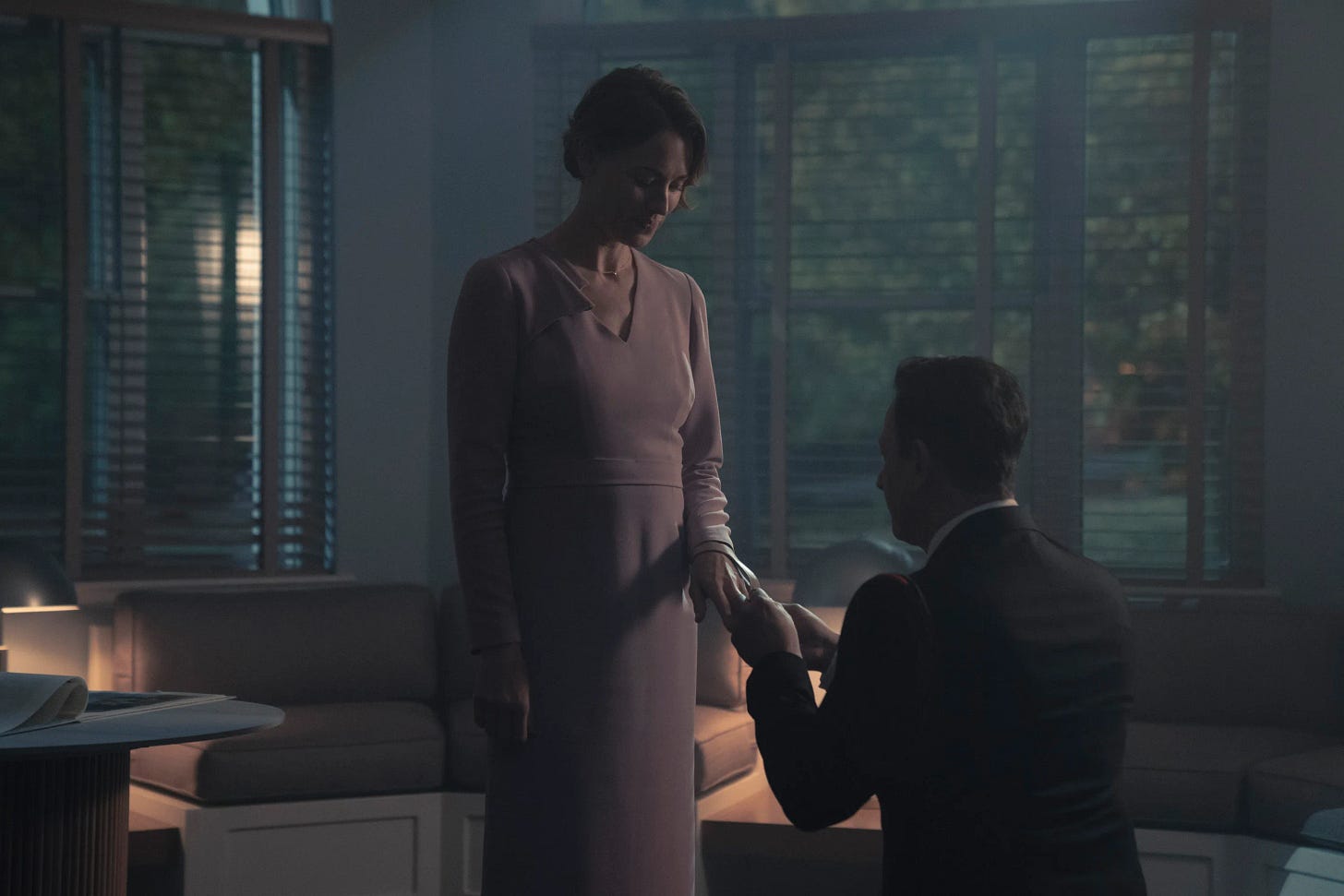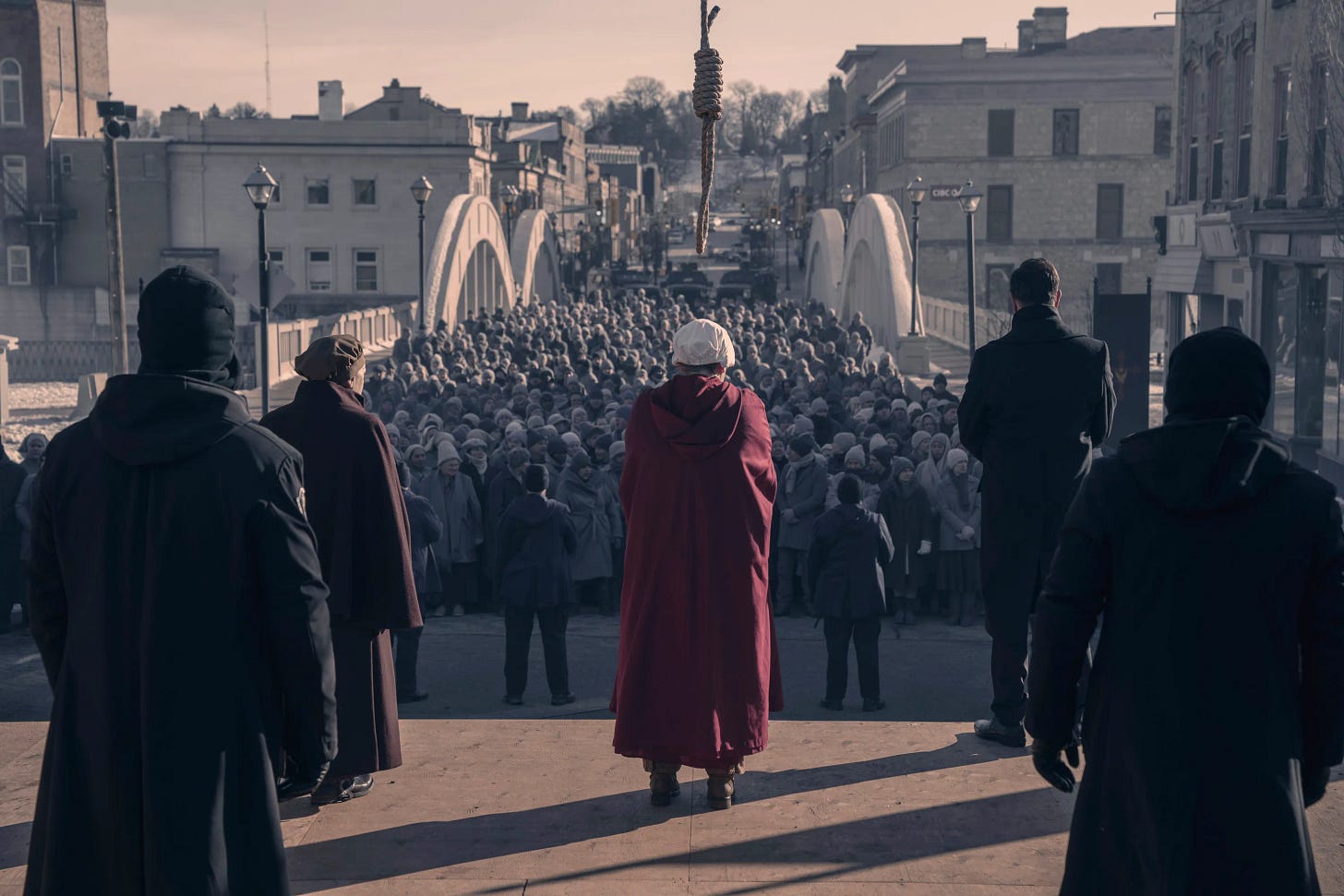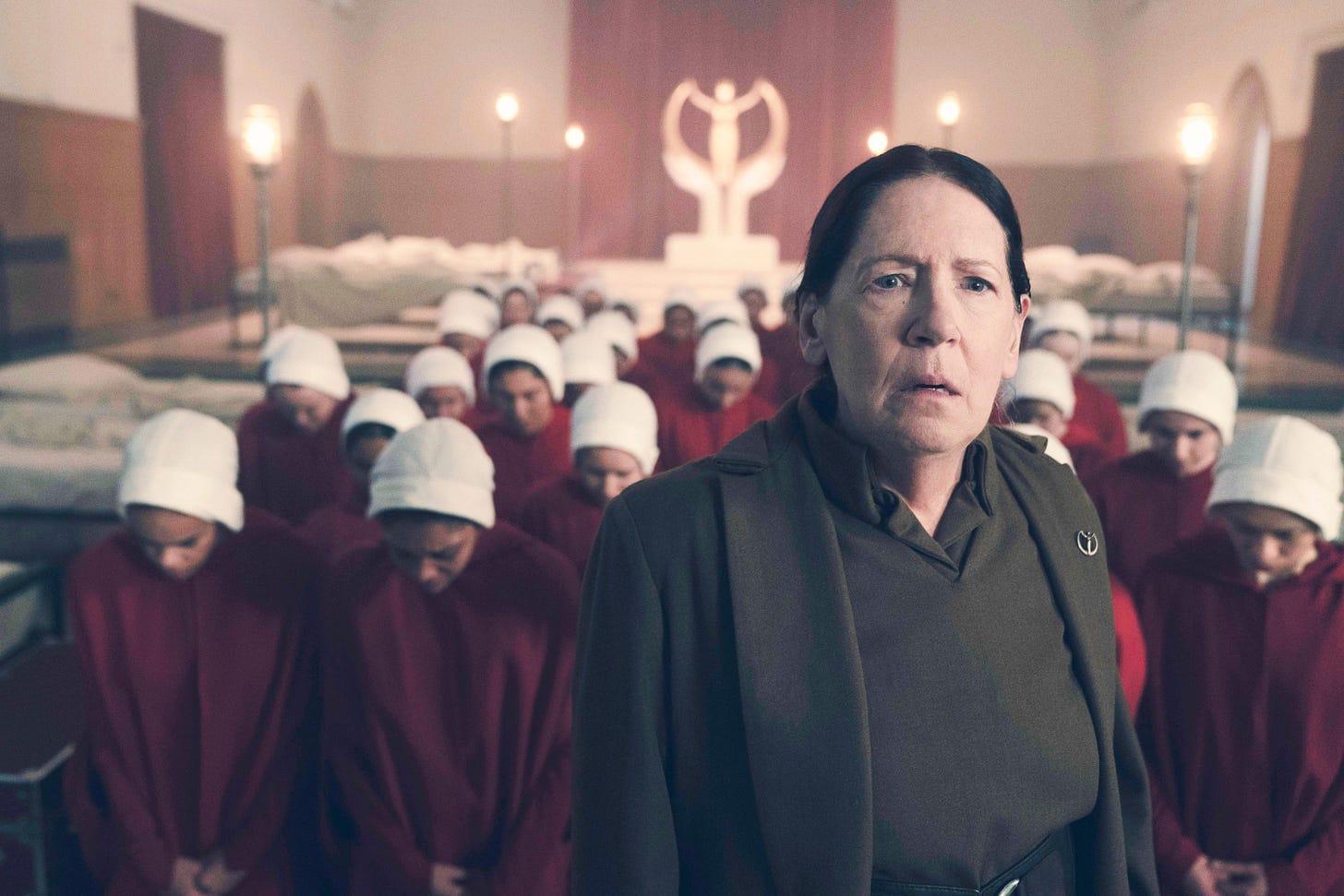The Handmaid's Tale Season 6 Review: The Fight Goes On
A breakdown of season 6 of The Handmaid's Tale and thoughts on the show's place in our current culture.
Note: This review has spoilers for season 6 of The Handmaid’s Tale. If you haven’t seen the season yet, this is your warning to turn away before I ruin it for you.
The final episode of The Handmaid’s Tale has aired, and I think long-time fans are having some feelings. I am one of those long-time fans, even through all of the ups and downs of the show, and I am indeed having some feelings. So let’s talk about this final season of a television show that captured an audience, but not enough to make them recognize the existential threat of a government that says women shouldn’t be allowed to make decisions about their own bodies. (Insert gif of Ralph from The Simpsons saying, “I’m in danger!”)
Season 6 of The Handmaid’s Tale was a bit of a mixed bag, with some episodes lending to pacing issues, but others reaching heights that we haven’t seen since the first season. It started incredibly strong with Train, where we get back into the mindset of June (Elisabeth Moss) and Serena Joy (Yvonne Strahovski). I continue to find these two women absolutely fascinating, and I love the way the series has portrayed their relationship, particularly Serena’s side of things, as her position is the most dynamic. Two women who might not have ever been friends, but could have been colleagues and had some level of respect between them, if only one weren’t the sex slave of the other’s husband. Starting the season with the two of them sorting through so many complicated feelings and beliefs was an excellent way to get back into the show.
The following three episodes show the perils of a long-running dystopian story, and that is that when you get away from the dystopia, things grind to a halt. It is kind of the overarching problem with The Handmaid’s Tale in general. We desperately want June to escape her captors in Gilead, but the most interesting parts of the show happen in Gilead. But to keep your interest in that, there needs to be an escalation of violence and horror, which can feel disengaging in a different sense. It’s frustrating that June escapes Gilead multiple times and then keeps returning, but if she didn’t return, it becomes a show about PTSD, and while that’s important, and I’m glad that the show did address that in some of the later seasons, it’s not the most engaging thing to watch.
Episodes 2, 3, and 4 take place primarily outside of Gilead, either with the Mayday folks trying to organize to take down Gilead, or in New Bethlehem, a kind of Gilead-light. For a story that took nearly three years between seasons 5 and 6, taking the viewers away from the place where it all started felt tedious. Additionally, the dual love interests for June also started to feel tedious. I will fully acknowledge that sorting out feelings in the midst of this level of trauma has to be incredibly difficult. Nevertheless, it felt largely like ground we had already covered in previous seasons, making this feel like the kind of retread that is hard to engage with.
Things begin to turn around in episode 5, Janine, when June and Moira go to Jezebels and meet Janine with a plan to save the women working there and kill the commanders who visit. June’s impulsiveness causes problems that escalate dramatically in episode 6, Surprise, when Commander Wharton (Josh Charles) demands the shutdown of Jezebels and the execution of all of the women who work there. We also see the wooing of Serena back into some kind of role in Gilead as she is courted by Commander Wharton. And we see Nick further cementing his position as a soldier for Gilead, who just happens to be in love with June, but is ultimately committed to his role as a Commander in Gilead.
After the failure of the plan to liberate the women in Jezebels, Mayday needs to make a new plan to dispatch the Commanders. Using the wedding of Serena Joy to Commander Wharton, they decide to dose the wedding cake with a sleep agent that will knock out the commanders and their wives, and give each handmaid a knife to do what needs to be done. Episode 8, Exodus, provides an excellent showdown between Aunt Lydia and the handmaids that was six seasons in the making. Like Serena, Lydia is another woman I have loved on this show. I think she genuinely cares about the handmaids, but in such a twisted way that it could only ever hurt them. Seeing her allow them to go felt honest, because for all of her brutality, she wanted to see these women safe.
We also see the newly married Whartons head home after the wedding, only for Serena to see a handmaid in her house. All the plans she had for continuing to write and be active in reforming Gilead flash before her as a pipe dream when she sees her new marriage unfolding exactly as her previous one did, with Gilead being a reality. She takes her son Noah and flees.
Everything in The Handmaid’s Tale season 6 led to episode 9, Execution. The handmaids carry out their plan, killing nearly all of the commanders. June is caught. She and Commander Wharton have an amazing exchange in the prison where she’s being held. It then moves to a public execution for the handmaids, with June at the center. She is offered an opportunity to atone for her sins before she is hanged, and she uses it to call out the evil she sees, an encouragement for people to fight for their freedoms, and the rousing cry, “Don’t let the bastards grind you down!”
The rebellion begins, and June is rescued, but a handful of high-ranking commanders remain. June finds Serena and asks her to give up the location and plans of these men. Eventually, Serena acquiesces, explaining that they will be flying to Washington, D.C., to gather with commanders from other areas to regroup. Mayday supplies Lawrence (Bradley Whitford) with a suitcase bomb that he intends to leave on the plane while escaping, but as he arrives at the airport, the other commanders, including Nick, arrive. All enter the plane, and the final shot is June’s face illuminated by the explosion in the night sky.
The Handmaid’s Tale finale has met with some mixed feelings, and I share those mixed feelings. It is a slow episode, wrapping up a lot of the stories in both satisfying and less satisfying ways. Alexis Bledel reprises her role as Emily in a poignant conversation with June, sharing what fighting for her family has looked like after leaving Gilead, transitioning into an amazing “what if” scenario with popular handmaids. I also loved that we didn’t get a resolution with Hannah or with Luke, though I absolutely loved that this couple, who endured the unimaginable, is still willing to make an effort to try to build a new life together.
I also appreciated Serena’s story. I thought the forgiveness that June offered was powerful, and I thought that seeing her as a refugee with her son was a good end (I’ll share what I think a great end could have been in a minute).
Less satisfying was Janine getting her daughter Charlotte back. Sure, it’s nice, but I cannot see a scenario where Naomi Putnam (Ever Carradine) gives away her child. I recognize that the relationships between wives and handmaids are complicated, particularly when it comes to their children, but Naomi is a very traditional person who never showed any signs of weakening to the influence of Gilead. In a show that didn’t try to tie everything up, this felt unearned.
Before I talk about the final scene, I want to share my very controversial take on how I think the show should have ended. I would have loved to see June die. Even just writing about her call to rebellion and her “Don’t let the bastards grind you down!” line makes me tear up. It was one of the most powerful moments in a show filled with powerful moments. And yes, it would be shocking to make her a martyr, but if anyone deserved that, it’s June. To die in service of the other handmaids and Mayday would be so fitting. And it could have worked to strengthen Serena as well, as she could have come forward willingly with the information to topple Gilead in Boston. Having her watch the remnants of her old life explode with her son in her arms, recognizing that he could have a new path, would have been incredibly strong.
I know that would have had people losing their minds, so I will allow the actual finale. But the show left an incredibly sour taste in my mouth with the final words that June utters.
In the final scene, June, dressed in a teal coat, the color that the wives wore, enters the room where the show started. And in a bookend moment, she repeats the monologue that she shares in episode one, which ends with the phrase, “My name is Offred.”
One of the things that The Handmaid’s Tale did exceptionally well was to hammer home how important a woman’s name was to her. One of the ways Gilead hurt women was to strip them of their names. The most powerful moments in the show’s history are when the handmaids tell one another their real names.
Women are under attack by the current administration. Abortion rights have been stripped from thousands of women. Currently, a woman, Adriana Smith, is having her body artificially kept alive despite her family’s wishes in service of the fetus she is carrying. There is a push for (white) women to abandon any dreams of anything other than motherhood in a perversion of Christianity to serve a fascistic regime. Trans people, and trans women specifically, are seeing their very existence being legislated away.
So yeah, ending a show that has stood so firmly for the power of women and queer people by using the name of the oppressor feels like a kick in the teeth. I don’t hate the bookend - it’s a device I use often enough myself - but a tweak to that line could have been so good. Something as simple as “Offred is the name they gave me, but my name is June” could have honored the start of the show, and the beginning of June’s book, without having June essentially deadnaming herself. It just felt like an undermining of what the show said time and time again.
Ultimately, The Handmaid’s Tale season 6 is a solid end to what has been a solid series. The book and the show were always about the fight. The fight against Christian nationalism. The fight against fascism. The fight against patriarchy. And not just the fight against things, but the fight for things. The fight for reproductive justice and freedom. The fight for bodily autonomy. The fight to love who you want. The fight to save your family from oppression. The fight to have your name known and spoken.
Let’s keep that fight going.
Rating: 4/5











